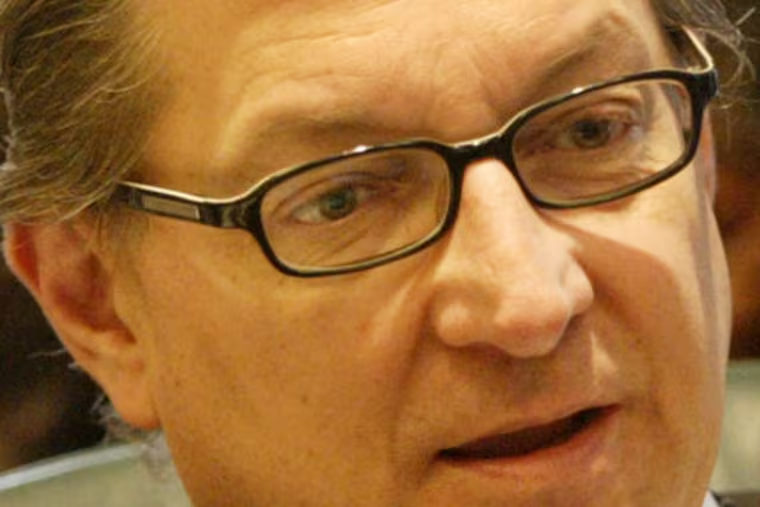Stu Bykofsky: Feeling singled out as '1 percenters'
AT "OCCUPY" encampments here and around the globe, many in the bottom "99 percent" are portraying the top "1 percent" as the scum of the earth. Some call it class warfare; others call it crass envy. How do the members of the "1 percent" feel? I asked three - Renee Amoore, Tom Knox and George Bochetto - each a local, unapologetic, self-made millionaire. They believe they already pay their "fair share" in federal taxes.

AT "OCCUPY" encampments here and around the globe, many in the bottom "99 percent" are portraying the top "1 percent" as the scum of the earth. Some call it class warfare; others call it crass envy. How do the members of the "1 percent" feel? I asked three - Renee Amoore, Tom Knox and George Bochetto - each a local, unapologetic, self-made millionaire. They believe they already pay their "fair share" in federal taxes.
"I don't only pay the 35 percent," says Center City lawyer Bochetto, who was raised in an orphanage. "I also pay Social Security tax, state and city income tax, property tax. More than half of my income goes to the government. That's my fair share."
Founder and CEO of the suburban-based Amoore Group, Renee Amoore says that she pays her fair share. However, as the head of a small business, she agrees with protesters that many on Wall Street make far too much. "I do see that as being unfair."
Bochetto says that not all 1-percenters are alike. "I understand the concern about CEOs of publicly held companies or banks, which have been subsidized by the federal government, making enormous $10- or $15- or $20-million salaries." But others in the 1 percent, he says, "work tirelessly, who have worked their entire lives without any public money," and there's a huge difference between the two.
"I agree with the 99 percenters on this," says Knox, a businessman and former candidate for mayor and governor who grew up in the projects. Many Wall Streeters "are overcompensated."
In rough economic terms, the top 1 percent control about 40 percent of America's wealth. I asked if that was fair.
"Not particularly," shrugs Bochetto.
"People who work hard and make money get to keep it, and people who do not work hard or are not industrious should not be given a free ride for the rest of their lives," says Knox.
Amoore says, "We do pay our taxes and we reach out to help other people, too."
Since Amoore, the deputy chairwoman of the Pennsylvania Republican Party, knows presidential candidate Herman Cain, I asked if she agrees with his statement that if you are not rich, blame yourself.
"You know what? Yes, I do," she says, adding "you can be rich in different ways."
Bochetto says that although "if you were a minority, it was a much rougher road," the 99 percenters who are complaining "could have been more determined, more focused and taken advantage of opportunities that are available to everybody."
Knox agrees that Cain has a point, but "some people never had the opportunity."
The flip side of Cain's remark was the crack from Massachusetts Democratic Senate candidate Elizabeth Warren that no one ever got rich on his own.
"She's a little quacky there," says Knox. "What she's trying to say is the help that you get is streetlights, roads, police. Who the hell paid for the streetlights, roads, police? That's your taxes. The 1 percent is paying 50 or 60 percent of the taxes."
Warren's statement is "complete and unadulterated nonsense," says Bochetto. For self-made millionaires, he says, "the government has impeded us every step of the way."
To help decrease the disparity between rich and poor, Bochetto endorses a free college education for anyone who can't afford it. Amoore, 58, agrees, and adds that good health care is important.
Knox says that "hard work" can overcome most obstacles, but "some people don't want to work hard and are content to be on welfare."
They all agree that the target of the protesters' wrath should be Washington.
"Washington has spent their money and spent it frivolously, and they have nothing to show for it," says Knox, citing an "$800 billion stimulus that was supposed to create jobs" and failed to do so. "And now they want another $450 billion?"
"They need to go to the Capitol," says Amoore, "where their message will keep getting lost," because their message is not clear.
Each of the three does more than just pile up profits. None got there working five-day, 40-hour weeks. Knox, 70, has tried to help by offering himself for public office, serves on committees and boards, gives to charity and just this year opened the Indecs insurance firm, creating 70 jobs.
Bochetto has flirted with public service, does pro-bono work and supports causes including veterans, education and Northwestern Human Services, a nonprofit serving mentally disabled people.
Amoore serves on "too many" boards and nonprofits, concentrating her efforts in health, education and economic development.
Anyone who thinks that these are bad people, selfish people, greedy people, is wrong.
I disagree with them on taxes. We could return to the 50 percent rate (from the current 35 percent) they paid under Ronald Reagan and they'd be fine.
I also think it's not quite as easy to get rich as they and Herman Cain believe, but getting rich doesn't mean you either inherited it or stood on taxpayers' backs, as Elizabeth Warren seems to think. Some did. The ones I talked with didn't.
Although not everyone sets being rich as a life goal, everyone would like to at least be comfortable. That ought to be possible in America, but it requires that everyone in America capable of working should work.
That's only "fair," too.